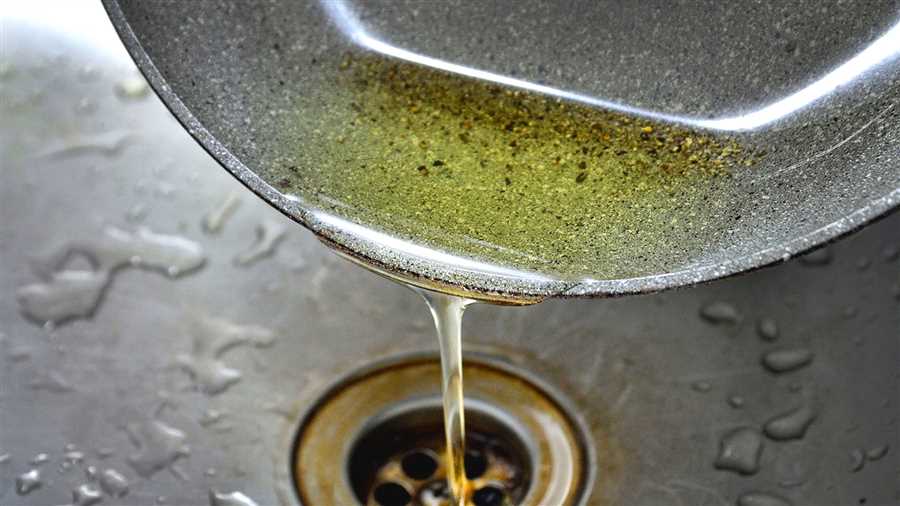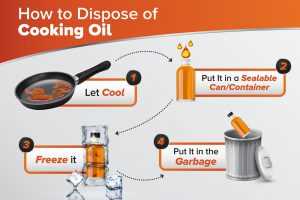Many people wonder if it is safe to pour cooking oil down the drain.
While it may seem convenient to dispose of cooking oil this way, it can actually cause significant damage to your plumbing system.
Cooking oil is a type of fat that solidifies when it cools down. When you pour hot oil down the drain, it may seem fine at first, but as it cools down, it can solidify and create clogs in your pipes. Over time, these clogs can lead to blockages and even burst pipes.
Additionally, cooking oil can also stick to the inner walls of your pipes, attracting other substances such as food particles and grease. This can further contribute to clogs and create a breeding ground for bacteria and foul odors.
So what should you do with your used cooking oil?
The best way to dispose of cooking oil is to let it cool completely, then pour it into a sealable container, such as an old jar or bottle. Once the container is full, you can then dispose of it in the trash. Some recycling centers and waste collection agencies may accept cooking oil, so it’s worth checking if there are any facilities near you.
In conclusion, pouring cooking oil down the drain is not a good idea. It can cause damage to your plumbing system and lead to costly repairs. Instead, take the time to properly dispose of your used cooking oil, and you’ll be helping to protect both your home and the environment.
Is it safe to pour cooking oil down the drain?
Pouring cooking oil down the drain may seem like an easy solution for getting rid of it, but it can actually cause damage to your plumbing and the environment. Here are a few reasons why you should avoid pouring cooking oil down the drain:
|
Clogs: Oil can solidify and clog your pipes, leading to blockages and backups. Over time, accumulated oil can cause serious plumbing issues that can be costly to fix. |
Environmental impact: When cooking oil enters the water system, it can contaminate streams, rivers, and oceans. This can harm aquatic life and disrupt the ecosystem. It is important to dispose of cooking oil properly to protect our environment. |
|
Infrastructure damage: The oil that goes down the drain can contribute to the buildup of a sticky substance called “fatbergs”. Fatbergs can block sewage systems and cause sewage backups. Municipalities have to spend resources to remove these blockages, which can result in increased costs for everyone. |
Recycling opportunities: Cooking oil can be recycled and converted into biofuels. By pouring it down the drain, you miss the chance to contribute to a more sustainable future and reduce our dependence on fossil fuels. |
Instead of pouring cooking oil down the drain, consider these alternative methods of disposal:
- Let the oil cool and solidify, then scrape it into a sealable container and throw it in the trash.
- Reuse the oil for cooking or baking multiple times.
- Find a local recycling center that accepts used cooking oil.
By adopting proper disposal methods, you can prevent plumbing issues, protect the environment, and contribute to a more sustainable future.
Environmental Impact of Pouring Cooking Oil Down the Drain
Pouring cooking oil down the drain may seem like a convenient way to dispose of it, but it can have serious negative effects on the environment. When oil is poured down the drain, it can lead to a range of problems, including clogged pipes, sewer backups, and environmental pollution. This article explores the environmental impact of pouring cooking oil down the drain and why it is necessary to find alternative methods for its disposal.
Clogged Pipes
One of the immediate consequences of pouring cooking oil down the drain is the clogging of pipes. When oil is poured down the drain, it can solidify and accumulate on the inner walls of the pipes, causing blockages. Over time, these blockages can grow in size and restrict the flow of wastewater, leading to plumbing issues and expensive repairs.
Sewer Backups
Pouring cooking oil down the drain can also contribute to sewer backups. When oil enters the sewer system, it can combine with other materials, such as wipes and debris, to form large clogs. These clogs can obstruct the flow of sewage and cause it to back up into homes and streets, posing a health hazard and requiring extensive cleanup efforts.
Environmental Pollution

Perhaps the most significant environmental impact of pouring cooking oil down the drain is pollution. Oil is not easily broken down by bacteria in the sewer system, and when it enters natural water bodies, such as rivers and streams, it can have detrimental effects on aquatic life. Oil can form a film on the water’s surface, blocking sunlight and oxygen from reaching plants and marine organisms. This can disturb the delicate balance of ecosystems, leading to the decline of various species.
Alternative Methods for Disposal
To minimize the environmental impact of pouring cooking oil down the drain, it is important to consider alternative disposal methods. One simple and effective option is to collect used cooking oil in a container and dispose of it in the trash. Many municipalities have programs in place for recycling used cooking oil, so you may be able to drop it off at a designated collection facility. Additionally, some communities offer grease recycling services or provide guidelines for proper disposal.
| Disposal Method | Advantages | Disadvantages |
|---|---|---|
| Collecting and disposing in trash | Easy and convenient | Can contribute to landfill waste |
| Recycling at designated facilities | Reduces environmental impact | May not be available in all areas |
| Using grease recycling services | Contributes to the production of biofuels | Limited availability in certain regions |
In conclusion, pouring cooking oil down the drain can have severe environmental consequences. Clogged pipes, sewer backups, and pollution are all potential outcomes of this improper disposal method. By exploring alternative methods, such as collecting and disposing of the oil in the trash or recycling it at designated facilities, individuals can play a significant role in protecting the environment and preserving the integrity of water ecosystems.
The risks of blocking your drains with cooking oil
Putting cooking oil down the drain may seem like a convenient way to dispose of it, but it can lead to serious problems and costly repairs. Here are some of the risks associated with this practice:
- Clogs and blockages: Cooking oil can solidify and accumulate in your drains, causing clogs and blockages. Over time, these blockages can become more severe, resulting in slow drainage or even complete pipe blockage.
- Bad odors: As cooking oil decomposes, it releases foul odors that can permeate your kitchen and home. These unpleasant smells can be difficult to eliminate and may require professional help to get rid of completely.
- Pipe damage: Over time, the accumulation of cooking oil can cause damage to your pipes. The solidified oil can stick to the interior walls of the pipes, leading to corrosion and potentially even bursting the pipes.
- Environmental impact: When cooking oil is disposed of improperly, it can contaminate waterways and harm aquatic life. The oil forms a film on the water’s surface, blocking sunlight and reducing oxygen levels, which can lead to the death of fish and other organisms.
Instead of pouring cooking oil down the drain, it is recommended to let it cool and solidify, and then dispose of it in the trash. Alternatively, you can collect used cooking oil in a sealed container and recycle it at a local recycling center. By taking these simple steps, you can help protect your drains, the environment, and avoid costly plumbing issues.
Proper disposal methods for used cooking oil
Properly disposing of used cooking oil is important in protecting the environment and preventing potential plumbing issues. Here are some recommended methods for disposing of used cooking oil:
1. Recycling Centers
Many recycling centers accept used cooking oil for recycling purposes. Check with your local recycling center to see if they have a program in place for used cooking oil disposal. Some centers may even pay you for your used oil!
2. Household Hazardous Waste Collection

In some areas, household hazardous waste collection facilities accept used cooking oil. These facilities are specially equipped to handle and dispose of hazardous materials in an environmentally friendly manner. Contact your local waste management department to find out if they have a program for used cooking oil disposal.
3. Solidification and Disposal in the Trash
If recycling or household hazardous waste collection facilities are not available in your area, you can solidify the used cooking oil and dispose of it in the trash. To do this, mix the oil with an absorbent material such as kitty litter, sawdust, or coffee grounds until it solidifies. Once solidified, place it in a sealed bag before throwing it in the trash.
4. Reuse or Donate
If the used cooking oil is still in good condition and can be reused, consider reusing it for cooking or donate it to local food banks or animal shelters. Some organizations accept used cooking oil for various purposes, such as making biodiesel or feeding animals.
Remember, it is important to never pour used cooking oil down the drain as it can lead to clogged pipes and cause harm to the aquatic ecosystem. By following these proper disposal methods, you can help protect the environment and prevent plumbing issues.
Questions and answers
Is it safe to pour cooking oil down the drain?
No, it is not safe to pour cooking oil down the drain. Cooking oil can solidify and clog the pipes, leading to costly repairs.
What should I do with used cooking oil?
You should never pour used cooking oil down the drain. Instead, you can reuse it for frying or dispose of it in a sealed container and throw it in the trash.
Why is pouring cooking oil down the drain bad?
Pouring cooking oil down the drain is bad because it can solidify and cause blockages in the pipes, leading to backups and potentially expensive plumbing repairs.
Can I put small amounts of cooking oil down the drain?
No, even small amounts of cooking oil can contribute to pipe blockages. It is best to avoid pouring any amount of cooking oil down the drain and find alternative methods of disposal.






